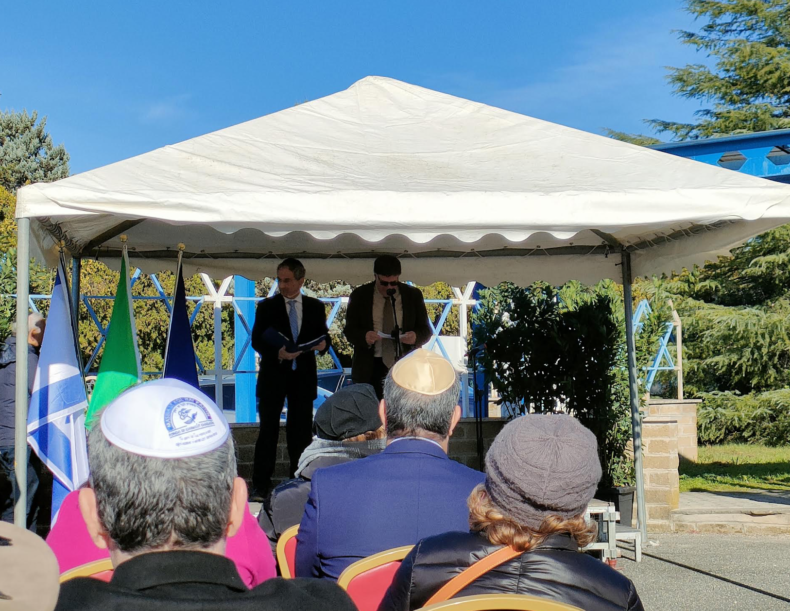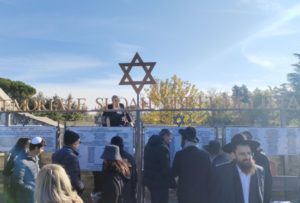“Jews expelled from the Arab world, a new attention is needed”

In 2014 the Knesset, the legislature of Israel, approved a law that declared November 30th as the annual National Day of Commemoration for Jewish refugees displaced from the Arab and Islamic world. On this symbolic day, the efforts of ASTREL– Association for the Safeguarding of the Transmission of the Jewish Heritage of Libya ensured that the city of Rome also welcomed a Memorial to remember the Libyan Jews who lost their lives because of the Nazi-fascists. It is a partial, yet already significant list that also includes other names not to be forgotten, namely the ones that were formerly engraved on the headstones of the Jewish cemeteries, desecrated, and destroyed since 1969. On that date, the millenary history of the Jews in Libya had just been permanently interrupted because of a further upsurge of pogrom and violence by the Arabs.
 “From pain to joy” stated David Gerbi, president of Astrel. He highlighted that the exiled Jews made an invaluable contribution to the Jewish life of Italy, especially in Rome. Their influence spread on multiple levels, namely the cultural, the social and the religious ones. It was Gerbi himself who called to the stage the numerous Institutions that wished to take part or even just send a supportive message to the initiative of the Memorial, established in the section dedicated to Jewish people in the Prima Porta cemetery.
“From pain to joy” stated David Gerbi, president of Astrel. He highlighted that the exiled Jews made an invaluable contribution to the Jewish life of Italy, especially in Rome. Their influence spread on multiple levels, namely the cultural, the social and the religious ones. It was Gerbi himself who called to the stage the numerous Institutions that wished to take part or even just send a supportive message to the initiative of the Memorial, established in the section dedicated to Jewish people in the Prima Porta cemetery.
“It is impressive to think that in the Rhineland, the Nazis left intact Jewish cemeteries from the medieval period, while in Libya cemeteries were replaced by roads and skyscrapers” this is what Rabbi Riccardo Di Segni sorely pointed out. “Keeping the memory is our duty. From now on this place is even more a house of life” he said. According to the reflection of Ruth Dureghello, president of the Roman Jewish Community, the pain of Jewish people in Libya “is a pain that everyone of us feels, without any difference”. And even “if nobody ever gives us back what is ours, we will have to be determined to preserve our identity, our unity and our commitment to life”. The purpose “is to go on along this path” said Dureghello.
Israel Ambassador Alon Bar began with some data: from about a million Jews once present between North Africa and the Middle East, the number has now dwindled to just a few thousand. “We are talking about a tragedy that has been forgotten by the public debate. The time has come for us to change this state of affairs”, this is what the diplomat suggested. Bar then praised “the strength and warmth” of the Libyan Jews.
 Also Noemi di Segni, UCEI president, showed her approval: “In this solemn moment – she wrote in a message read by Gerbi – on behalf of all the Italian Jewish Communities, I wish to express the feeling of unity and community in the commemoration dedicated to our fellow worshippers in Libya and in the bond that has been created among us all through the events of Italy’s painful History “. Hope, effort, and the commitment to return honour, cultural space, properties, and dignity “are certainly UCEI’s goals, but we also make an appeal that the same is true for the other Italian Institutions as well”. The Institutions “must take responsibility even today for what happened yesterday”.
Also Noemi di Segni, UCEI president, showed her approval: “In this solemn moment – she wrote in a message read by Gerbi – on behalf of all the Italian Jewish Communities, I wish to express the feeling of unity and community in the commemoration dedicated to our fellow worshippers in Libya and in the bond that has been created among us all through the events of Italy’s painful History “. Hope, effort, and the commitment to return honour, cultural space, properties, and dignity “are certainly UCEI’s goals, but we also make an appeal that the same is true for the other Italian Institutions as well”. The Institutions “must take responsibility even today for what happened yesterday”.
A speech was also given by Alfredo Conte, Principal Director for the Mediterranean and Middle East Countries of the Farnesina – Italian’s Ministry of Foreign Affairs –, and Shimon Doron, vice president of Bar-Ilan University. Among others, a message of solidarity was sent by senator and former minister Giulio Terzi di Sant’Agata and Giuseppe Benedetto, president of the Einaudi Foundation.
Also present at Prima Porta was the 94-year-old Allegra Guetta Naim, who suffered the Fascist persecution and was imprisoned in the concentration camp of Giado. Last week she and thirty other witnesses of the Libyan Judaism discussed her past with the students of the Jewish School of Rome. “I must confess this is a very emotional moment for me”, she said before removing the veil from the sign indicating as of now the presence of the Memorial: a new space of memory and awareness.
Translation by Martina Bandini, revised by Annadora Zuanel, students at the Secondary School of Modern Languages for Interpreters and Translators of the University of Trieste, interns at the newspaper office of the Union of the Italian Jewish Communities – Pagine Ebraiche.
